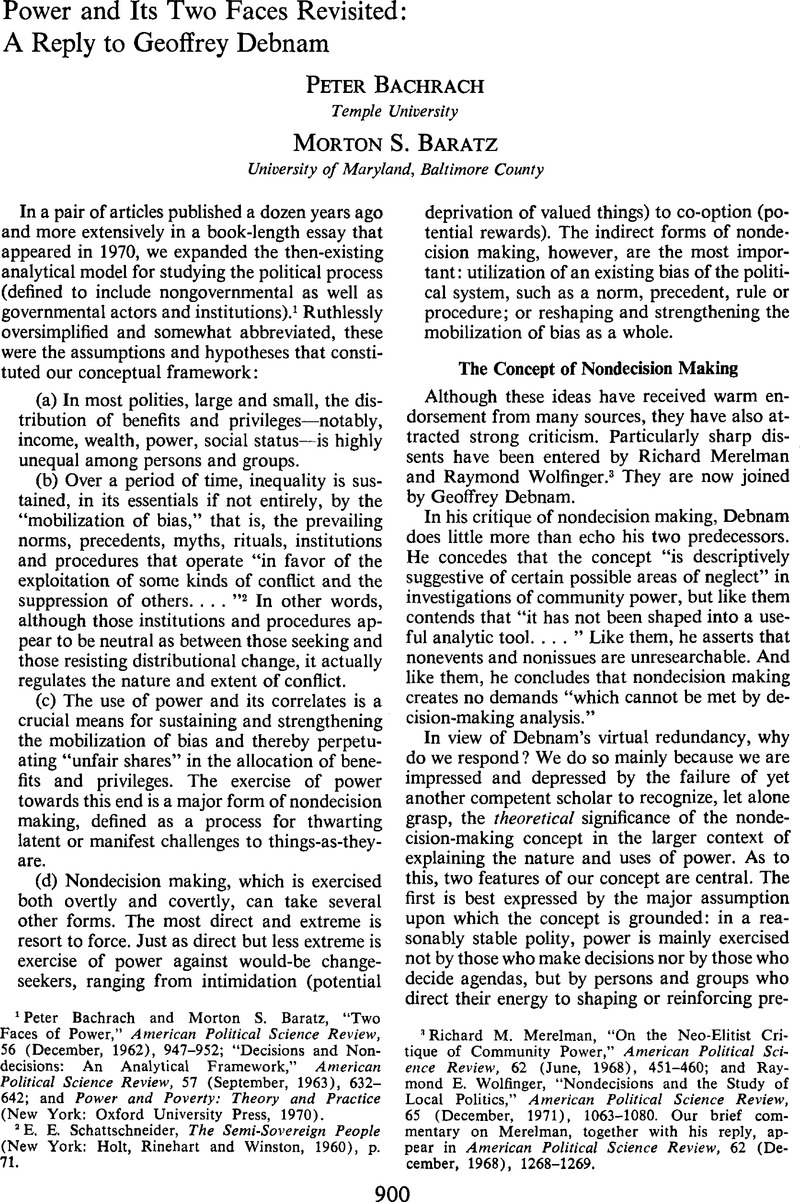Article contents
Power and Its Two Faces Revisited: A Reply to Geoffrey Debnam
Published online by Cambridge University Press: 01 August 2014
Abstract

- Type
- Nondecisions and Power: The Two Faces of Bachrach and Baratz
- Information
- Copyright
- Copyright © American Political Science Association 1975
References
1 Bachrach, Peter and Baratz, Morton S., “Two Faces of Power,” American Political Science Review, 56 (12, 1962), 947–952 CrossRefGoogle Scholar; “Decisions and Nondecisions: An Analytical Framework,” American Political Science Review, 57 (09, 1963), 632–642 CrossRefGoogle Scholar; and Power and Poverty: Theory and Practice (New York: Oxford University Press, 1970)Google Scholar.
2 Schattschneider, E. E., The Semi-Sovereign People (New York: Holt, Rinehart and Winston, 1960), p. 71 Google Scholar.
3 Merelman, Richard M., “On the Neo-Elitist Critique of Community Power,” American Political Science Review, 62 (06, 1968), 451–460 CrossRefGoogle Scholar; and Wolfinger, Raymond E., “Nondecisions and the Study of Local Politics,” American Political Science Review, 65 (12, 1971), 1063–1080 CrossRefGoogle Scholar. Our brief commentary on Merelman, together with his reply, appear in American Political Science Review, 62 (12, 1968), 1268–1269 CrossRefGoogle Scholar.
4 We suspect that our conception of “interest” is still too narrowly drawn to permit a thorough analysis of consensus in circumstances where there appears to be no dissent in a polity, overt or covert. Perhaps, as Matthew A. Crenson suggests in his first-rate comparative study of nondecision making ( The Unpolitics of Air Pollution: A Study of Non-Decision-making in Two Cities [Baltimore: The Johns Hopkins Press, 1971])Google Scholar and as Lukes, Steven argues in his brilliant essay, Power: A Radical View (London: Macmillan, 1974)CrossRefGoogle Scholar, our error is to rely upon a subjective conception of interest. For a discussion of this issue as it relates to “false” consciousness, see Balbus, Isaac D., “The Concept of Interest in Pluralist and Marxist Analysis,” Politics and Society, 1 (02, 1971), pp. 151–177 CrossRefGoogle Scholar; Connolly, William E., The Terms of Political Discourse (Lexington: D. C. Heath, 1974), pp. 45–85 Google Scholar; and Bachrach, Peter, “Interest, Participation and Democratic Theory,” in Participation, ed. Pennock, Roland and Chapman, John (New York: Atherton Press, 1975)Google Scholar.
5 Debnam's argument on this point is contradictory. On one hand, he contends acts of this kind can be observed through use of techniques of decision-making analysis. Yet, on the other hand, he characterizes such acts as nonevents and therefore non-observable.
6 Verba, Sidney and Nie, Norman H., Participation in America: Political Democracy and Social Equality (New York: Harper & Row, 1972)Google Scholar.
7 Ibid., pp. 272–285.
8 Ibid., p. 335. Emphasis in original.
9 Ibid., p. 342.
10 Wrong, Dennis H., “Some Problems in Defining Social Power,” American Journal of Sociology, 73 (05, 1968), 673–681, at 677 CrossRefGoogle Scholar.
11 For a defense of this position, see Georgiou, Petro, “The Concept of Power: A Critique and an Alternative” (Unpublished; University of Melbourne, 1974)Google Scholar.
- 35
- Cited by



Comments
No Comments have been published for this article.